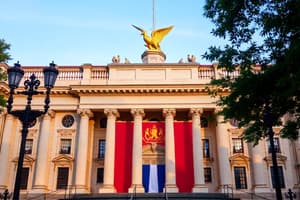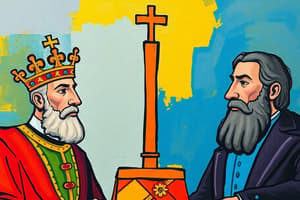Podcast
Questions and Answers
What type of sovereignty is characterized by absolute power, such as in monarchies?
What type of sovereignty is characterized by absolute power, such as in monarchies?
- Federal Sovereignty
- Popular Sovereignty
- Personal Sovereignty (correct)
- Parliamentary Sovereignty
Which type of power uses fear or violence rather than legitimacy?
Which type of power uses fear or violence rather than legitimacy?
- Natural Power
- Influence
- Coercion (correct)
- Public Authority
What describes the legal right to rule based on laws and procedures?
What describes the legal right to rule based on laws and procedures?
- Charismatic Power
- Natural Authority
- Legal Power (correct)
- Traditional Power
Which combination describes a single nation coinciding with a political entity?
Which combination describes a single nation coinciding with a political entity?
In which type of authority do leaders emerge during crises, often holding significant sway?
In which type of authority do leaders emerge during crises, often holding significant sway?
What kind of state has multiple nations existing within its territory?
What kind of state has multiple nations existing within its territory?
Which is NOT a form of legitimate power?
Which is NOT a form of legitimate power?
What is the primary characteristic of a state?
What is the primary characteristic of a state?
What is the primary source of law governing Canada's legal system?
What is the primary source of law governing Canada's legal system?
Which of the following is NOT a disadvantage of common law?
Which of the following is NOT a disadvantage of common law?
Why is uniformity considered an advantage of legislation?
Why is uniformity considered an advantage of legislation?
What advantage does common law offer regarding judicial decision-making?
What advantage does common law offer regarding judicial decision-making?
Which issue can arise due to the dependence on legal proceedings in common law?
Which issue can arise due to the dependence on legal proceedings in common law?
How does legislation differ from common law in terms of legal interpretation?
How does legislation differ from common law in terms of legal interpretation?
Which of the following is a challenge faced by Indigenous communities in Canada regarding legal equality?
Which of the following is a challenge faced by Indigenous communities in Canada regarding legal equality?
What does judicial creativity in common law allow judges to do?
What does judicial creativity in common law allow judges to do?
What does reform liberalism advocate for in contrast to classical liberalism?
What does reform liberalism advocate for in contrast to classical liberalism?
Which of the following is NOT a central feature of conservatism?
Which of the following is NOT a central feature of conservatism?
How do conservatives view equality before the law?
How do conservatives view equality before the law?
What is a potential criticism of conservatism's focus on limited government?
What is a potential criticism of conservatism's focus on limited government?
Which example illustrates the concern regarding fairness in conservatism?
Which example illustrates the concern regarding fairness in conservatism?
What characterizes a multi-state nation?
What characterizes a multi-state nation?
Which of the following is an example of a stateless nation?
Which of the following is an example of a stateless nation?
Which type of constitution is characterized by being a formal document outlining government structure?
Which type of constitution is characterized by being a formal document outlining government structure?
What is a major advantage of unwritten constitutions?
What is a major advantage of unwritten constitutions?
Which of the following principles does NOT relate to the rule of law?
Which of the following principles does NOT relate to the rule of law?
What does judicial independence ensure?
What does judicial independence ensure?
Which element of the rule of law guarantees that all citizens have equal protection under the law?
Which element of the rule of law guarantees that all citizens have equal protection under the law?
How does Legal Aid contribute to the rule of law?
How does Legal Aid contribute to the rule of law?
What is a key characteristic of democratic accountability in legislation?
What is a key characteristic of democratic accountability in legislation?
Which of the following is an example of a comprehensive scope of legislation?
Which of the following is an example of a comprehensive scope of legislation?
What is a disadvantage associated with overlapping jurisdictions in legislation?
What is a disadvantage associated with overlapping jurisdictions in legislation?
How does realism view the nature of international relations?
How does realism view the nature of international relations?
In the context of realism, what prompted Canada to focus on defending its sovereignty in the Arctic?
In the context of realism, what prompted Canada to focus on defending its sovereignty in the Arctic?
Which principle is associated with classical liberalism?
Which principle is associated with classical liberalism?
In which of the following does reform liberalism differ from classical liberalism?
In which of the following does reform liberalism differ from classical liberalism?
Which of the following is a feature of the Liberal international approach?
Which of the following is a feature of the Liberal international approach?
Study Notes
Sovereignty
- Supreme power to govern oneself or another state
- Includes making laws, enforcing them, and carrying out executive functions
- Can be divided between federal and provincial levels or delegated by legislation
- Types:
- Personal: Absolute sovereignty, like monarchies
- Parliamentary: Legislative body has supreme legal authority, like Brexit
- Popular: Consent of the people, like democracies
Power
- Coercion: Power through fear, violence, or financial hardship. Subjects have no choice, and power lacks legitimacy. Examples: China, Russia, and North Korea
- Influence: Power through persuasion. Uses emotional appeals and self-group interest. Examples: Algorithms.
- Authority/Legitimacy: Power based on respect.
- Natural: Based on personal characteristics, like an "authority" figure.
- Public: Created through majority agreement, like being "in authority" through votes.
Authority
- Traditional Power: Inherited and often considered a "divine right," like monarchies and feudal systems.
- Legal Power: Right to rule based on laws and procedures, like democracies. The power is held only while the leader has been legitimately given it. Legitimacy crisis may occur if this power is abused.
- Charismatic Power: Transcendent, often emerging during times of crisis. Examples: Adolf Hitler.
State vs. Nation
- State: Political entity with a defined territory, permanent population, government, and the ability to interact with other states. Possesses sovereignty. Example: Country.
- Nation: Group of people sharing a common identity, like language, culture, or history. Example: A cultural group.
- Combinations:
- Nation-State: Nation and state coincide. Example: Japan.
- Multinational State: Multiple nations within a state. Example: India.
- Binational State: Two nations exist within a state. Example: Canada.
- Multi-State Nation: Nation divided into individual states. Example: North and South Korea.
- Stateless Nations: Nations without their own state. Examples: Palestinians, Kurds.
- Diaspora Nations: Nations dispersed across multiple states. Examples: The Jewish nation, French and Spanish speakers.
Constitutions
- Written: Formal document outlining government structure, power division, and citizen rights and responsibilities. Usually clear and comprehensive. Example: USA.
- Unwritten: Based on customs, conventions, precedents, and legal documents rather than a single document. Evolves organically and is adaptable, but lacks clarity. Example: The UK.
- Hybrid: Combines a foundational document outlining basic principles with unwritten norms and conventions. Example: Canada.
Rule of Law
- Based on principles of legality, equality before the law, accountability, and justice.
- Requires clear, publicized, and consistently applied laws, binding both government and citizens.
- Elements:
- Legality: Government actions must be based on established laws. Example: The Canadian Charter of Rights and Freedoms limits government actions and protects rights.
- Equality before the Law: No one is above the law, and all citizens are entitled to equal protection and benefits. Example: The Supreme Court of Canada’s ruling on Same-Sex Marriage upheld equality rights and paved the way for legalization.
- Judicial Independence: Courts must be impartial and independent from other government branches. Example: The Judges Act ensures judicial security of tenure, financial security, and institutional independence.
- Access to Justice: Citizens must have access to legal redress and fair procedures. Example: Legal aid provides subsidized legal assistance to those who cannot afford it to ensure money is not a barrier to legal recourse.
- Challenges:
- Indigenous communities face barriers to full equality before the law.
- Migrant workers also face challenges.
- Underfunded legal aid limits access to justice for marginalized groups.
- Political pressures can sometimes overcome judicial independence, as seen with the 2019 SNC-Lavalin Affair.
Common Law vs. Legislation
- Common Law: Based on judicial decisions and precedents established in courts. Used in most Canadian provinces and territories, except Quebec.
- Legislation: Written laws enacted by Parliament or provincial legislatures. Example: Criminal Code, Provincial statutes. Primarily governs Canada's legal system.
- Common Law Advantages:
- Adaptability to societal change: Can evolve with changing social norms.
- Flexibility in interpretation: Judges can interpret laws to address contemporary issues.
- Judicial Creativity: Judges can fill gaps in legislation.
- Common Law Disadvantages:
- Inconsistency between provinces: Laws may not exist or be difficult to establish and control.
- Dependence on legal proceedings: Precedent may not exist and can be difficult to establish or control afterward.
- Unpredictable outcomes: Can be uncertain and case law under-developed.
- Legislation Advantages:
- Uniformity and Clarity: Clear and accessible rules across Canada, except for Quebec civil laws.
- Democratic Accountability: Legislation is enacted by elected representatives, reflecting the democratic process.
- Comprehensive scope: Legislatures can create laws covering a wide range of issues.
- Legislation Disadvantages:
- Overlapping jurisdictions: Federal and provincial legislatures can conflict.
- Rigidity: Change can be slow and politically contentious.
- Political Influence: Laws can be based more on political agendas than legal reasoning.
Realism and Liberal International Approaches
- Realism: Emphasizes power, national interest, and the anarchic nature of international relations. Focus on state sovereignty and competition, viewing conflict as inevitable. Example: Canada's response to Arctic sovereignty issues, increased Russian and American presence prompting Canadian focus on defending sovereignty in the Arctic, strengthening military capabilities, and asserting control over disputed territories like the Northwest Passage.
- Liberalism/International Approach: Promotes cooperation, international institutions, and global governance. Views states as capable of working together. Advocates for diplomacy and shared norms. Example: The United Nations, Paris Climate Agreement, and NAFTA/USMCA.
Liberalism: Classical vs. Reform
- Classical Liberalism: Emphasizes individual freedom, limited government intervention, private property rights, and free market principles. Minimal state involvement in economic and social affairs, focusing on protecting individual rights and maintaining law and order. Example: The Charter of Rights and Freedoms restricts government power and prioritizes individual rights over state interests.
- Reform Liberalism: Advocates for more government involvement to address social inequalities and provide public goods. True freedom requires not only the absence of coercion but also opportunities and social safety nets. Example: Universal healthcare, CPP, and EI ensure health and financial insecurity do not hinder success.
Conservatism
- Focus on maintaining established institutions, moral and cultural preservation, reducing taxes through reduced welfare and social programs, and increasing privatization.
- Advocate for deregulation to establish an unfettered free market.
- Accept unequal outcomes and accept inequality so long as rules and order apply equally.
- Believe in social responsibility and cohesion, but these are less equitable in practice due to large gaps in equality.
- Example: A $200 speeding ticket disproportionately affects a person living paycheck to paycheck compared to someone making $1 million per year.
Studying That Suits You
Use AI to generate personalized quizzes and flashcards to suit your learning preferences.
Related Documents
Description
This quiz explores the concepts of sovereignty, power, and authority. It covers various types of sovereignty, the means through which power is exerted, and the legitimacy of authority. Engage with different political systems and their characteristics to deepen your understanding.




